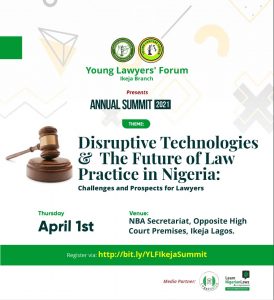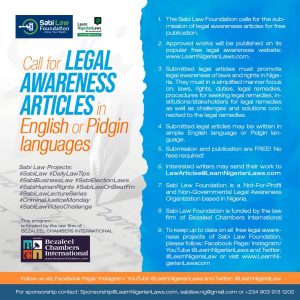Duty of Care Owed By Banks in Nigeria. Daily Law Tips (Tip 768) by Onyekachi Umah, Esq., LL.M, ACIArb(UK)
Introduction:
In a bank-customer relationship, the bank is the servant to its customer. The relationship is based on trust while the customer of a bank believes and expects his bank to be prudent and transparent. In managing the monies of customers and performing other banking services, banks owe duty of care to their customers. Once such duty is breached, the concerned bank becomes negligent and is expected to pay/compensate the affected customer. So, here is a summary of the duty of care owed by banks in Nigeria to their customers.
Bank-Customers and the Duty of Care:
Being a customer to a bank, simply creates a fiduciary relationship (a relationship based on good faith and trust). As such, there is a higher duty of care expected from banks, because of the fiduciary. Fiduciary makes the duty of care owed by banks to customers to be higher and above that of an ordinary person. Contrary to public opinion, the duty of care that flows from fiduciary relationships do not need legislations and regulations to be perceived or performed.
Duty of care owed by banks in Nigeria to their customers will be discussed further through the judgments of the Supreme Court of Nigeria and the Court of Appeal.
- Aside any legislation, common law principles and regulations from the Central Bank of Nigeria, there is a minimum duty of care affixed and expected of any bank in Nigeria. This is the duty to exercise reasonable care and skill in carrying out its customer’s instructions. This has been reiterated by the Supreme Court of Nigeria in the case of DIAMOND BANK LIMITED V. PARTNERSHIP INVESTMENT COMPANY LIMITED & ANOR (2009) LPELR-939(SC), wherein the apex court held that; “… a Bank has a duty to exercise reasonable care and skill in carrying out its customer’s instructions. That this duty extends over the whole range of banking business within the contract with the customer.”
- The judgment of the Supreme Court in the case of UNION BANK OF NIGERIA PLC v. MR. N.M. OKPARA CHIMAEZE (2014) LPELR-22699(SC), confirms this when it held that; “…the appellant [bank] is a fiduciary to the respondent. It owes the respondent a duty to exercise a high standard of care in managing the respondent’s money.”
- The decision of the Court of Appeal in the case of GUARANTY TRUST BANK v. CHIEF DOTUN OYEWOLE & ANOR (2013) LPELR-22166(CA), is very instructive; “By the state of pleadings of both parties, it is not disputed that 1st Respondent is an account holder with the Appellant which issued the 1st Respondent Account number 421/421752/110. This fact alone establishes a fiduciary relationship which thereby elicits a duty of care by the Appellant to the 1st Respondent. A breach of such a duty of care imposes a liability for negligence on the bank (The Appellant). (See Afribank Nig. Plc v. A. I. Investment Ltd (2002) 7 NWLR (Pt.765) 40, Agbanelo v. UBN Ltd (2000) 23 WRN 1, Ndoma-Egba v. A.C.B. (2005) 7 SC (Pt.111) 27.” Per DONGBAN-MENSEM ,J.C.A (Pp. 10-11 paras. E)
- The Court of Appeal in the case of CHIEF JOSEPH OLUWOLE ODULATE v. FIRST BANK NIGERIA LIMITED (2019) LPELR-47353(CA), held that; “It is true in law and in fact to state that Banks owe their customers a duty of care. Banks are professional and commercial keepers of money who have represented that they would keep in safe custody any money or other valuables their customers may keep with them. The law holds them to that promise and also expects Banks to promptly comply with lawful instructions of their customers with regards to money kept in the Bank’s custody. The Apex Court in the case of UBN PLC v. CHIMAEZE (2014) LPELR-22699(SC) (Pp. 40-41, paras. G-A) Per ARIWOOLA J.S.C “…the appellant is a fiduciary to the respondent. It owes the respondent a duty to exercise a high standard of care in managing the respondent’s money.”
- The judgment of the Supreme Court in the case ZENITH BANK v. ATO PROPERTIES LTD (2019) LPELR-47783(CA), where the court held that; “My lords, when it comes to the relationship between a bank and its customer, or whoever is having dealings with a bank in connection with his funds with the bank, it is settled law that generally a Bank in its dealings with its customers owes to them a duty of care and thus negligence if proved is a ground for liability against a Bank by its customer. It follows therefore, that between the Appellant, a Bank and its customer, the Respondent, negligence will arise where the bank, breaches the implied duty to observe the standard expected of a reasonable banker in respect of dealings with the customer’s fund and the onus, of proving that it is not negligent lies on the Appellant, the Bank.”
- Also, the appellate court in the case of DIAMOND BANK LIMITED v. MOCOK ONU NIGERIA LIMITED (2019) LPELR-46440(CA), reiterated the duty of care owed by all commercial banks in Nigeria to their respective customers; when it held that; “The relationship between the appellant and the respondent is discernable from the averments in paragraphs 2 and 3 of the statement of claim as well as paragraph 2 of the statement of defence. By the combined effect of the said averments, the respondent maintained a current account with the appellant, a registered commercial bank. The nature of such relationship has been given recognition in plethora of judicial decisions that it involves a specie of contract with special usages with particular reference to monetary or commercial transactions. Consequently, a banker has a duty under its contract with its customer to exercise reasonable care and skills in carrying out its part with regards to transactions in its contract with its customers. The Banker’s duty to exercise reasonable care and skills stretches over the whole range of banking business within the ambit of the contract with the customer. This duty applies to interpreting, ascertaining and acting in accordance with the instruction of the customer. See N.N.B. LTD V ODIASE (1993) 8 NWLR (pt 310) 235, FIRST BANK OF NIGERIA LTD V AFRICAN PETROLEUM LTD (1996) 4 NWLR (pt 443) 438, U. B. A. V FOLARIN (2003) 7 NWLR (pt 818) 18, AGBANELO V UNION BANK PLC (2000) 7 NWLR (pt 666) 534 and LINTON INDUSTRIES. TRADING CO. (NIG) LTD V C.B.N. (2015) 4 NWLR (pt. 1447) 94.”
Conclusion:
Banks and other financial institutions are regulated by the Central Bank of Nigeria, in line with federal laws and regulations. For the fact that a bank-customer operates a bank account with a bank, creates a bank-customer relationship and a duty of care on the bank. Consequently, at all times, a bank must be careful, prudent, transparent, faithful and honest in relating and managing the affairs of its customer. Where a bank fails in its duty of care, the bank is negligent and the concerned customer may complain to the Central Bank of Nigeria (the federal regulator of banks in Nigeria) and or approach a court of law for redress.
My authorities, are:
- Sections 1, 2, 3, 4, 5 and 6 of the Constitution of the Federal Republic of Nigeria, 1999.
- Sections 1, 2, 60 and 61 of Central Bank of Nigeria Act, 2007.
- Judgment of the Supreme Court of Nigeria in the case of UNION BANK OF NIGERIA PLC v. MR. N.M. OKPARA CHIMAEZE (2014) LPELR-22699(SC)
- Judgement of the Supreme Court of Nigeria in the case of DIAMOND BANK LIMITED V. PARTNERSHIP INVESTMENT COMPANY LIMITED & ANOR (2009) LPELR-939(SC)
- The judgment of the Court of Appeal in the case of GUARANTY TRUST BANK v. CHIEF DOTUN OYEWOLE & ANOR (2013) LPELR-22166(CA)
- The judgment of the Court of Appeal in the case of CHIEF JOSEPH OLUWOLE ODULATE v. FIRST BANK NIGERIA LIMITED (2019) LPELR-47353(CA)
- The judgment of the Court of Appeal in the case of DIAMOND BANK LIMITED v. MOCOK ONU NIGERIA LIMITED (2019) LPELR-46440(CA)
- The judgment of the Court of Appeal in the case of ZENITH BANK v. ATO PROPERTIES LTD (2019) LPELR-47783(CA)
- Onyekachi Umah, “What is Negligence in the Eyes of Law?” (LearnNigerianLaws.com, 31 March 2021) <https://sabilaw.org/what-is-negligence-in-the-eyes-of-law/> accessed 31 March 2021
- Onyekachi Umah, “You are Responsible for the Safety of Your Guests, Invitees and Visitors” (LearnNigerianLaws.com, 6 June 2018) <https://sabilaw.org/daily-law-tips-by-onyekachi-umah-esq-tip-116-you-are-responsible-for-the-safety-of-your-guests-invitees-and-visitors/> accessed 31 March 2021.
- Onyekachi Umah, “Can the Central Bank of Nigeria blacklist a Bank Employee?” (LearnNigerianLaws.com, 29 March 2021) <https://sabilaw.org/can-the-central-bank-of-nigeria-blacklist-a-bank-employee/> accessed 31 March 2021
- Onyekachi Umah, “The Central Bank of Nigeria Notices on Cryptocurrencies; a Ban or a Banger?” (LearnNigerianLaws.com, 9 February 2021) <https://sabilaw.org/the-central-bank-of-nigeria-notices-on-cryptocurrencies-a-ban-or-a-banger/> accessed 31 March 2021.
- Onyekachi Umah, “Who Are The Shareholders Of The Central Bank Of Nigeria” (LearnNigerianLaws.com, 7 February 2019) <https://sabilaw.org/daily-law-tips-by-onyekachi-umah-esq-tip-263-who-are-the-shareholders-of-the-central-bank-of-nigeria/> accessed 31 March 2021
- Onyekachi Umah, ”How To Prove That A Bank Is Licensed In Nigeria” (LearnNigerianLaws.com, 30 March 2019) <https://sabilaw.org/how-to-prove-that-a-bank-is-licensed-in-nigeria-daily-law-tips-tip-300-by-onyekachi-umah-esq-llm-aciarb-uk/> accessed 31 March 2021
- Onyekachi Umah, “Contents Of A Genuine ATM Receipt In Nigeria” (LearnNigerianLaws.com, 19 March 2019) <https://sabilaw.org/contents-of-a-genuine-atm-receipt-in-nigeria-daily-law-tips-tip-292-by-onyekachi-umah-esq-llm-aciarb-uk/> accessed 31 March 2021
- Onyekachi Umah, “Is It Illegal To Spray Or Dance On Naira Notes (Money) In Nigeria” (LearnNigerianLaws..com, 21 December 2018) <https://sabilaw.org/daily-law-tips-by-onyekachi-umah-esq-tip-254-is-it-illegal-to-spray-or-dance-on-naira-notes-money-in-nigeria/> accessed 31 March 2021
- Onyekachi Umah, “No Bank In Nigeria Can Unilaterally Change /Vary Interest Rate In Its Agreement With A Customer” (LearnNigerianLaws.com, 23 August 2018) <https://sabilaw.org/daily-law-tips-by-onyekachi-umah-esq-tip-168-no-bank-in-nigeria-can-unilaterally-change-vary-interest-rate-in-its-agreement-with-a-customer/> accessed 31 March 2021
- Onyekachi Umah, “Use/Demand for Foreign Currency in Nigeria is a Crime” (LearnNigerianLaws.com, 7 June 2018) <https://sabilaw.org/daily-law-tips-by-onyekachi-umah-esq-tip-117-use-demand-for-foreign-currency-in-nigeria-is-a-crime/> accessed 31 March 2021
- Pic credit: graphic. com.gh
Sabi Law Projects:
#SabiLaw
#DailyLawTips
#SabiBusinessLaw
#SabiElectionLaws
#SabiHumanRights
#SabiLawOnTheBeatFm
#SabiLawLectureSeries
#CriminalJusticeMonday
#SabiLawVideoChallenge
Speak with the writer, ask questions or make inquiries on this topic or any other via onyekachi.umah@gmail.com, info@LearnNigerianLaws.com or +2348037665878 (whatsapp). To receive free Daily Law Tips, join our free WhatsApp group via https://chat.whatsapp.com/L7h4f1exItZ38FeuhXG4WN or Telegram group, via the below link: https://t.me/LearnNigerianLaws
To keep up to date on all free legal awareness projects of Sabi Law Foundation, follow us via
Facebook Page:@LearnNigerianLaws,
Instagram:@LearnNigerianLaws,
Twitter: @LearnNigeriaLaw,
YouTube: Learn Nigerian Laws,
WhatsApp Groups via (https://chat.whatsapp.com/L7h4f1exItZ38FeuhXG4WN),
Telegram Group: (https://t.me/LearnNigerianLaws),
Facebook group: (https://www.facebook.com/groups/129824937650907/?ref=share)
or visit our website: (www.LearnNigerianLaws.com)
Please share this publication for free till it gets to those that need it most. Save a Nigerian today! NOTE: Sharing, modifying or publishing this publication without giving credit to the author or Sabi Law Foundation is a criminal breach of copyright and will be prosecuted. This publication is the writer’s view not a legal advice and does not create any form of relationship. You may reach the writer for more information.
This publication is powered by www.LearnNigerianLaws.com {A Free Law Awareness Program of Sabi Law Foundation, supported by the law firm of Bezaleel Chambers International (BCI).} Sabi Law Foundation is a Not-For-Profit and Non-Governmental Legal Awareness Organization based in Nigeria. For sponsorship and partnership, contact: sponsorship@learnnigerianlaws.com, sabilaw.ng@gmail.com or +234 903 913 1200.

























































3 Responses